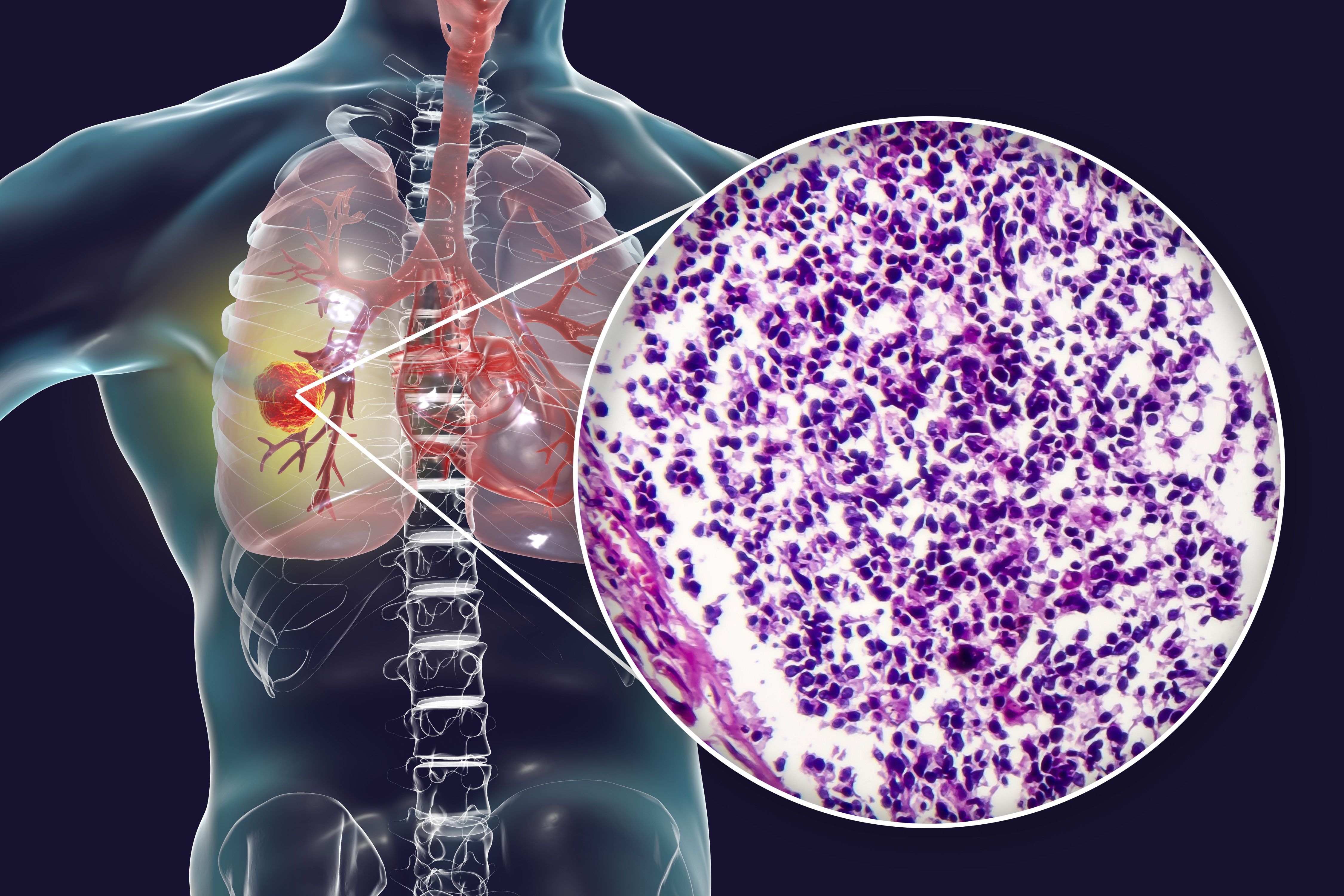Adebrelimab With Chemotherapy Extends Overall Survival in SCLC
Based on phase 3 study results of patients with extensive-stage small cell lung cancer, treatment with adebrelimab plus chemotherapy prolonged overall survival compared with matched placebo.

In patients administered adebrelimab plus chemotherapy for extensive-stage small cell lung cancer (SCLC), overall survival (OS) was superior compared with patients treated with matched placebo, meeting the primary end point of phase 3 trial (NCT03711305).
The median OS was 15.3 months (95% CI, 13.2-17.5) in the adebrelimab group vs 12.8 months (95% CI, 11.3-13.7) in the placebo (HR, 0.72; 95% CI, 0.58-0.90; P = .0017). The 12-month OS rates were 62.9% vs 52.0%; rates at 24 months were 31.3% and 17.2% in the adebrelimab and placebo groups, respectively.
“These findings support adebrelimab plus carboplatin and etoposide as a new first-line treatment option for extensive-stage SCLC. The progression-free survival [PFS], overall response rate [ORR], and duration of response [DOR] are favorable in the adebrelimab plus chemotherapy group,” Ying Cheng, MD, a professor at Jilin Cancer Hospital in Changchun, China, said during the presentation.
A total of 462 patients were randomly assigned to either the adebrelimab (n = 230) or placebo (n = 232) groups. In the adebrelimab group, 213 patients ultimately discontinued treatment compared with 229 in the placebo group because of disease progression (162 vs 185, respectively), withdrawal of consent (19 vs 22), death (11 vs 4), maximum treatment duration (8 vs 2), investigator decision (7 vs 7), or adverse effects (AEs; 6 vs 7). In total, 17 patients in the adebrelimab group and 3 in the placebo remained on treatment at the data cut-off of October 8, 2021. Median follow-up was 13.5 months in all patients and 22.5 months in patients who were still alive.
Patients received 20 mg/kg of adebrelimab plus carboplatin at area under the curve of 5 on day 1 plus etoposide at 100 mg/m2 on days 1 to 3 every 3 week for 4 to 6 cycles. Then patients progressed to single-agent adebrelimab at 20 mg/kg every 3 weeks until disease progression or unacceptable toxicity. The chemotherapy regimen was the same in the placebo group.
Patient baseline characteristics included a median age of 62 years in both group; those 65 years or older comprised 32.6% of the experimental group and 36.6% of the control group. A majority of patients in the adebrelimab and placebo groups were men (80.0% vs 81.0%, respectively), had an ECOG performance score of 1 (85.7% vs 87.1%), were former smokers (78.3% vs 77.2%), and had stage IV disease (96.5% vs 97.4%). Liver metastases (31.7% vs 31.9%) and brain metastases (2.2% vs 2.2%) were observed in the adebrelimab vs placebo groups, respectively.
OS by subgroup revealed consistent benefit with the use of adebrelimab vs chemotherapy alone, including in those younger than 65 years (0.71; 95% CI, 0.54-0.93) and 65 years or older (0.70; 95% CI, 0.48-1.00); current/former smokers (0.75; 95% CI, 0.59-0.95) and without smoking history (0.59; 95% CI, 0.37-0.95); with lactate dehydrogenase (LDH) at or above upper limit of normal (ULN; 0.83; 95% CI, 0.62-1.11) and below the ULN (0.59; 95% CI, 0.42-0.82); with liver metastases (0.92; 95% CI, 0.65-1.31) and without (0.61; 95% CI, 0.46-0.81); with brain metastases (0.68; 95% CI, 0.55-0.85); stage IV disease (0.72; 95% CI, 0.58-0.90); and with PD-L1 status at or above 1% (0.72; 95% CI, 0.33-1.59) or below 1% (0.66; 95% CI, 0.52-0.83).
The PFS via blinded-independent central review showed a median of 5.8 months (95% CI, 5.6-6.9) in the adebrelimab group and 5.6 months (95% CI, 5.5-5.7) in the placebo group (HR, 0.67; 95% CI, 0.54-0.83; P <.0001).
PFS by subgroup revealed consistent benefit with the use of adebrelimab vs chemotherapy alone, including in those younger than 65 years (0.70; 95% CI, 0.54-0.91) and 65 years or older (0.62; 95% CI, 0.43-0/89); current/former smokers (0.76; 95% CI, 0.69-0.96) and without smoking history (0.44; 95% CI, 0.27-0.71); with lactate dehydrogenase (LDH) at or above upper limit of normal (ULN; 0.64; 95% CI, 0.48-0.85) and below the ULN (0.70; 95% CI, 0.52-0.95); with liver metastases (0.74; 95% CI, 0.51-1.07) and without (0.64; 95% CI, 0.50-0.83); with brain metastases (0.65; 95% CI, 0.53-0.81); stage IV disease (0.68; 95% CI, 0.55-0.83); and with PD-L1 status at or above 1% (0.70; 95% CI, 0.34-1.45) or below 1% (0.68; 95% CI, 0.54-0.85).
Investigators reported a confirmed ORR of 70.4% (95% CI, 64.1%-76.3%) in the adebrelimab group and 65.9% (95% CI, 59.5%-72.0%) in the placebo group. Best overall response was a complete response in 7 (3.0%) vs 4 (1.7%) patients in the adebrelimab and placebo groups, respectively; a partial response in 155 (67.4%) vs 149 (64.2%); stable disease in 45 (19.6%) vs 58 (25.0%); and progressive disease in 16 (7.0%) vs 10 (4.3%).
Patients also had a median duration of response of 5.6 months (95% CI, 4.6-6.7) vs 4.6 months (95% CI, 4.3-5.5), and an ongoing response at 12 months in 32 patients (19.8%) vs 6 patients (3.9%), and a disease control rate of 90.0% (95% CI, 85.4%-93.6%) vs 90.9% (95% CI, 86.5%-94.3%) in the adebrelimab and placebo groups, respectively.
Grade 3/4 treatment-related (TR)AEs occurred in 195 patients in both the adebrelimab (84.8%) and placebo (84.1%) groups. Additionally, 12 patients (5.2%) in the adebrelimab group discontinued treatment due to TRAEs compared with 9 (3.9%) in the placebo, and 2 patients each group (0.9%) had TRAEs leading to death. Additionally, 64 patients (27.8%) in the adebrelimab group had immune-mediated AEs compared with 40 (17.2%) in the placebo.
Common grade 3/4 TRAEs included decreased neutrophil count, decreased white blood cell count, anemia, and decreased platelet count.
Reference
Wang J, Zhour C, Yao W, et al. Adebrelimab or placebo plus carboplatin and etoposide as first-line treatment for extensive-stage SCLC: a phase 3 trial. Presented at: American Association for Cancer Research (AACR) 2022 Annual Meeting; April 8-14, 2022; New Orleans, LA. Abstract CT038.





